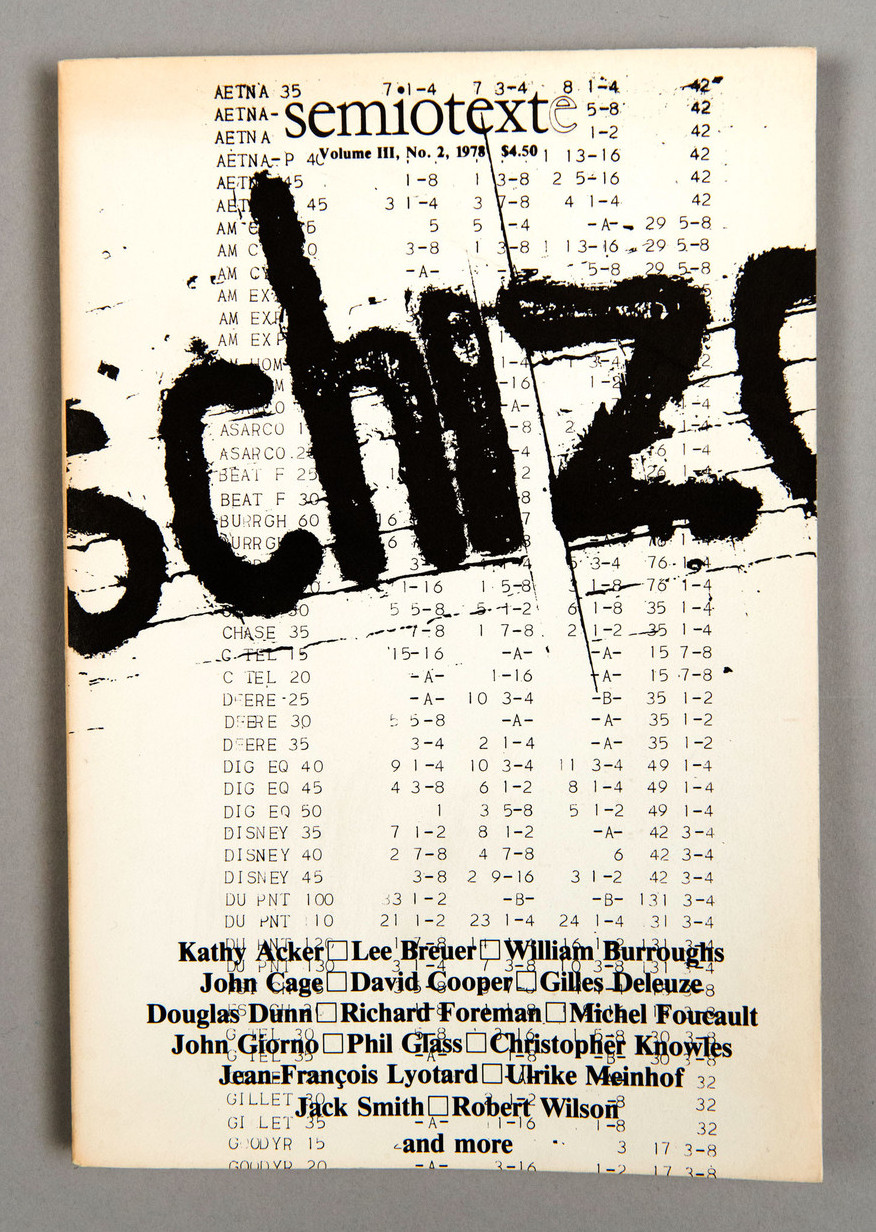Semiotext(e), 3(2): Schizo-Culture (1978)
Filed under journal | Tags: · anti-psychiatry, capitalism, linguistics, literature, philosophy, politics, power, psychoanalysis, schizoanalysis, schizophrenia, semiotics

“Semiotext(e) began in 1974 as a journal started by French philosopher Sylvère Lotringer in an effort to bridge radical French theory and the intellectual and art worlds of New York City. The original editorial board included ten people, mostly graduate students at Columbia University where Lotringer teaches, who chipped in fifty dollars apiece to get the journal started. They held their first conference in 1975: the Schizo-Culture conference on prisons and madness. Speakers included Gilles Deleuze, Félix Guattari, Michel Foucault, and Jean-François Lyotard, now all staples of the Semiotext(e) backlist.” (from Wikipedia)
With contributions by Kathy Acker, Lee Breuer, William Burroughs, John Cage, David Cooper, Gilles Deleuze, Douglas Dunn, Richard Foreman, Michel Foucault, John Giorno, Phil Glass, Christopher Knowles, Jean-Francois Lyotard, Ulrike Meinhof, Jack Smith, Robert Wilson, and others.
Edited by Sylvère Lotringer
Publisher Semiotext(e), New York, 1978
ISSN 00939579
221 pages
PDF (8 MB, updated on 2013-12-8)
See also Semiotext(e), 3(1): Nietzsche’s Return (1978).
Comments (2)Krzysztof Wodiczko: Critical Vehicles: Writings, Projects, Interviews (1999)
Filed under book | Tags: · art, art criticism, avant-garde, constructivism, politics, public space, technology

“Krzysztof Wodiczko, one of the most original avant-garde artists of our time, is perhaps best known for the politically charged images he has projected onto buildings and monuments from New York to Warsaw—images of rockets projected onto triumphal arches, the image of handcuffed wrists projected onto a courthouse facade, images of homeless people in bandages and wheelchairs projected onto statues in a park from which they had been evicted. In projects such as the “Homeless Vehicle,” which he designed through discussions with homeless people, Wodiczko has helped to make public space a place where marginalized people can speak, establish their presence, and assert their rights.
Critical Vehicles is the first book in English to collect Wodiczko’s own writings on his projects. Wodiczko has stated that his principal artistic concern is the displacement of traditional notions of community and identity in the face of rapidly expanding technologies and cultural miscommunication. In these writings he addresses such issues as urbanism, homelessness, immigration, alienation, and the plight of refugees. Fusing wit and sophisticated political insight, he offers the artistic means to help heal the damages of uprootedness and other contemporary troubles.”
Publisher MIT Press, 1999
Writing Art series
ISBN 0262731223, 9780262731225
227 pages
Review: Ben Highmore (Art History, 2001).
PDF (updated on 2012-11-19)
Comment (0)Andrew Wilson: Belarus: The Last European Dictatorship (2011)
Filed under book | Tags: · 1990s, 2000s, belarus, economics, politics

This book is the first in English to explore both Belarus’s complicated road to nationhood and to examine in detail its politics and economics since 1991, the nation’s first year of true independence. Andrew Wilson focuses particular attention on Aliaksandr Lukashenka’s surprising longevity as president, despite human rights abuses and involvement in yet another rigged election in December 2010.
Wilson looks at Belarusian history as a series of false starts in the medieval and pre-modern periods, and at the many rival versions of Belarusian identity, culminating with the Soviet Belarusian project and the establishment of Belarus’s current borders during World War II. He also addresses Belarus’s on-off relationship with Russia, its simultaneous attempts to play a game of balance in the no-man’s-land between Russia and the West, and how, paradoxically, Belarus is at last becoming a true nation under the rule of Europe’s “last dictator.”
Publisher Yale University Press, 2011
ISBN 0300134355, 9780300134353
304 pages
review (Lucy Popescu, Independent)
PDF (16 MB, updated on 2014-9-14)
Comment (0)
